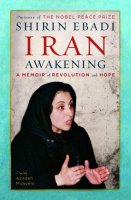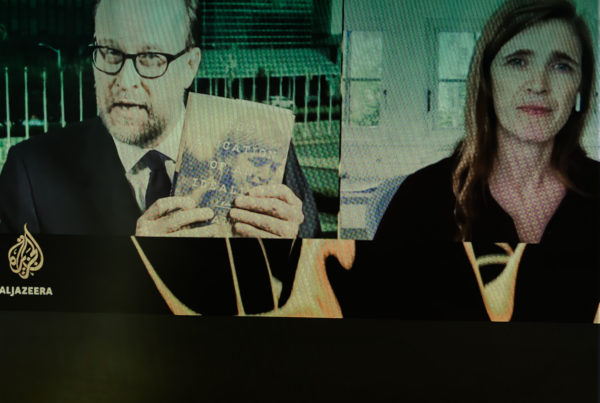 Most people in the Muslim Middle East are anti-American but their rulers are vassals of Washington, while the reverse is true in Iran. But George W. Bush risks turning Iranians against the United States with his aggressive approach to the Iranian nuclear program, says Nobel Laureate Shirin Ebadi.
Most people in the Muslim Middle East are anti-American but their rulers are vassals of Washington, while the reverse is true in Iran. But George W. Bush risks turning Iranians against the United States with his aggressive approach to the Iranian nuclear program, says Nobel Laureate Shirin Ebadi.
Speaking by phone before arriving in Toronto last week on a promotion tour for her memoir, Iran Awakening, she said:
“The United States has supported non-democratic governments in the region. The people there who want freedom are, therefore, upset at the U.S.
“But the U.S. has had no relations with Iran since the 1979 revolution, so it has not had the opportunity to support the government. Iranians have been increasingly disappointed with their government, but they’ve had no reason to be dissatisfied with the U.S.
“I hope the U.S. will not make the mistake of attacking Iran militarily. If it did, it will no longer benefit from the pro-American sentiment in Iran. The situation will reverse. The people will not support the U.S. but will defend their land.”
Ebadi said the only solution to the Iran-U.S. nuclear impasse is, (a) direct U.S.-Iran negotiations, and (b) the development of democracy in Iran.
The U.S. missed a golden opportunity during the 1997-2005 term of reformist president Mohammed Khatami, who was stymied by unelected powerful clerics.
“The United States could have lifted the (bilateral) economic sanctions, created goodwill and paved the way for negotiations between the two countries. That would have strengthened the reformists. But it did not.
“In fact, the American foreign policy in the Middle East has been a series of mistakes.”
These have included Iraq and the Israeli-Palestinian dispute. Ebadi has called the latter an “unfair conflict — stones on one side and an army on the other.” But in Iran, she opposed the 2000 trial of 13 Iranian Jews, saying “they are Iranian citizens, just like I am,” and that persecution of non-Muslims is un-Islamic.Typical of her even-handed approach, Ebadi said Khatami himself made many mistakes. In battling conservative clerics, he backed off too often, instead of using his massive mandate as a democratic weapon. He failed to curb corruption. He failed to fix the economy, leaving nearly 10 million Iranians in dire poverty, many of whom have since helped elect the fundamentalists to both the presidency and parliament.
Iran has slid back into increased censorship and crackdown on dissidents, as shown by the recent arrest of author Ramin Jahanbegloo, a former Canadian professor.
“He has had no access to lawyers and his case has not even been presented for trial to court,” Ebadi said. “He has committed no crime. The only thing he has done is to write.”
About the case of Zahra Kazemi, the Montreal photojournalist killed in a Tehran jail, Ebadi said: “Justice is yet to be served. The court refuses to listen to our defence. It said the murderer remains unidentified. We are in the last stage of objection to the court finding. That is the last legal resort we have.
“But even if the case is closed by the Iranian legal system, it will not be closed in the eyes of Iranian public opinion. The Iranian people will always remember that a journalist, a woman, was killed innocently as a result of torture in an Iranian prison.”
I asked her about the irony that clerics have turned Iranians against Islam and are presiding over increased prostitution and drug use.
Poverty and widespread disenchantment, she said, have led to social decay. But she retains her faith.
She defies Western stereotypes. In Iran, she dons the hijab (“that’s the law”) whereas abroad, she wears a suit.
Ebadi notes the irony that the introduction of the hijab gave conservative Iranian families the confidence to send their daughters to universities. Now 63 per cent of post-secondary students in Iran are women.
Ebadi believes in separation of church and state, while defending Islam: “Like any other religion, Islam is open to various interpretations.
“There is no contradiction between Islam and human rights. If a country commits human rights abuses in the name of Islam, then it’s not the fault of Islam.”



